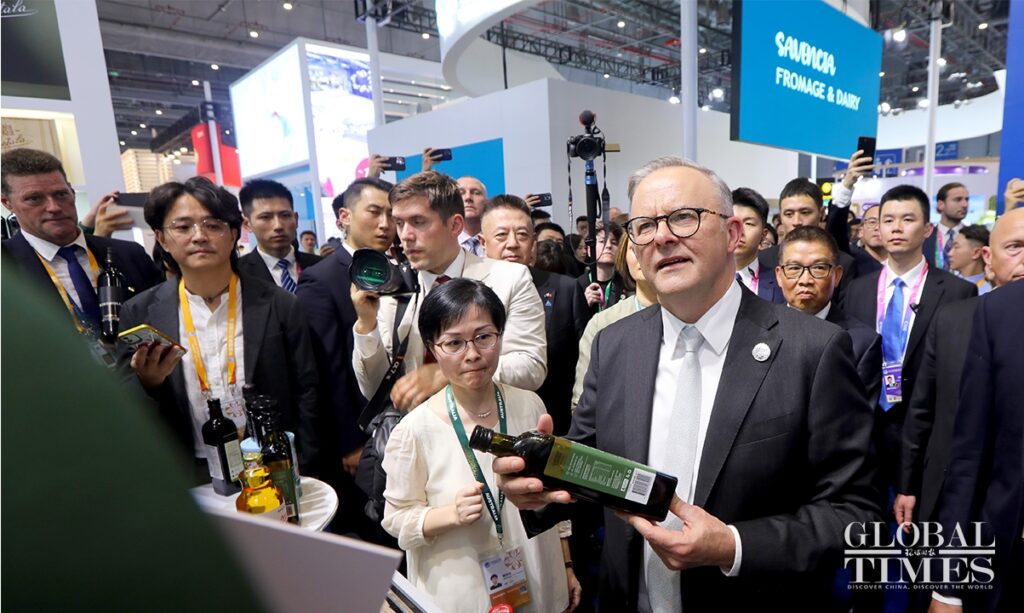With high-profile visit, largest CIIE participation, Canberra won’t follow US ‘decoupling’
The China-Australia relationship is “mature” and “energized by the complementary nature of our economies,” Australia’s Prime Minister Anthony Albanese – the first Australian prime minister to visit China in seven years – said on Sunday at the opening of the 6th China International Import Expo (CIIE) being held in Shanghai, while Australia has dispatched the largest delegation ever with more than 250 companies exhibiting at the expo.
Albanese said that it was “in all our interests” to have a bilateral relationship with dialogue and cooperation, Reuters reported on Sunday. “Along with the other economies in our region, Australia and China have prospered thanks to the certainty and stability that is made possible by rules-based trade,” he said.
Albanese also vowed to “work constructively” with China, saying that “constructive economic engagement between countries helps to build relationships… that is why the government that I lead will continue to work constructively with China,” the AFP reported on Thursday.
Albanese visited the booths of Australian enterprises with officials on Sunday at the CIIE, where he listened to the on-site introduction and took pictures with the exhibitors, the Global Times saw. The Australian exhibitors had prepared beforehand with product displays featuring characteristic decorations such as koalas with excitement.
Albanese began his four-day visit to China on Saturday at the invitation of Chinese Premier Li Qiang, as he is paying an official visit to China from Saturday to Tuesday while attending the opening of the CIIE and relevant events, according to China’s Foreign Ministry.
Chinese experts said that the official visit is a positive move to further bolster economic and trade exchanges for the two countries, while showing that Australia is not going to follow the US’ so-called “decoupling” from China.
Albanese’s presence at the CIIE shows that Australia clearly refuses to comply with the US attempt to “decouple” from China, Chen Hong, director of the Australian Studies Center at East China Normal University, told the Global Times on Sunday.
Chen said that the “mature” bilateral relationship will not be simply aggravated by trade disputes, which should be properly handled rather than being politicized and weaponized against China.
He noted that Albanese’s emphasis on the constructive and complementary nature of relations will inject more vitality into continuing the momentum.
More than 250 Australian companies are attending this year’s CIIE, presenting products from top sellers from seafood, beef and wine to iron ore, according to a Reuters report on Friday.
Multiple Australian exhibitors expressed their excitement about attending the ongoing CIIE amid thawing bilateral relations, saying that they expected to grasp the opportunity to further bolster their businesses in China.
Jacky Magid, co-owner of Charlie’s Fine Food Co, which makes cookies and biscuits, told the Global Times on Sunday that she looks forward to engaging with Chinese customers and getting feedback on the products, stressing the importance for the company to have a presence at the CIIE.
Alvin Liu, Melrose Group’s head of China, said that the company, which focuses on healthcare products, is aiming to connect with more partners through this expo to assist it to enter China’s physical retail market. He noted that China is the company’s most important overseas market, with sales growing at 12 to 20 percent annually over the past two years.
Sunny Liang, chief operating officer of Jatcorp, which makes dairy and nutrition products, told the Global Times that it is the sixth year for the company to attend the CIIE, and the expo has played a crucial role for Jatcorp to access the Chinese market.
“We participated in the first CIIE in 2018 and entered the Chinese market afterward, and now exports to China account for 90 percent of the company’s business,” Liang said.
China is an irreplaceable market for Australia, especially for its economic recovery while bringing huge benefits for major cooperating industries such as agriculture, Song Wei, a professor at the School of International Relations and Diplomacy at the Beijing Foreign Studies University, told the Global Times on Sunday.
Chen Hong expects that more cooperation potential would be unleashed in sectors such as the green economy, on top of consolidating the established foundation in major cooperation fields.
One-quarter of Australia’s export earnings come from China, more than the next three trade partners – the US, South Korea and Japan – combined, Albanese said on Tuesday, according to Reuters.
Observers stressed the significance of establishing a communication mechanism on the basis of mutual respect to continuously advance the normalization and progress of trade and economic exchanges, adding that the improvement in economic relations will also promote the sound development of the overall bilateral relationship.
According to a survey by Austcham China, nearly 90 percent of the 91 surveyed foreign companies – mainly Australia -operating in China indicated that they will maintain or increase their investments in the market, and 70 percent are optimistic about the long-term development of their businesses in China.
Before Albanese, multiple Australian senior officials visited China throughout 2023. For instance, former West Australian premier Mark McGowan told the Global Times during his visit in April that calls for “decoupling” “are now in the past” and now there is “an appetite for a better relationship with China” after the new federal government took office.
(Global Times)




